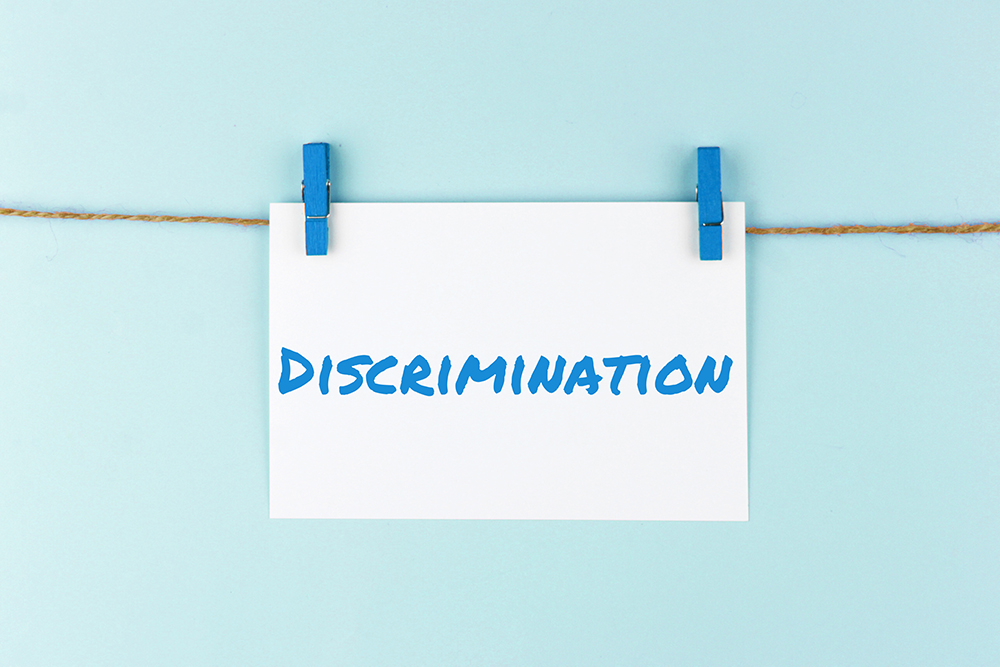
Get the Fair Treatment You Deserve
State and federal laws prohibit discrimination on the basis of age, sex, disability, race, religion, or national origin. Some of these laws also protect against discrimination based on sexual orientation or identity.
Illegal discrimination occurs when an employer treats an employee or applicant negatively because of their age, sex, race, religion, or other impermissible factor. This can happen based on various reasons. However, no cause can justify discrimination of any kind.
If you believe that you have been mistreated at work, contact a work discrimination lawyer today.
Examples of Work Discrimination
Here is an overview of different discrimination situations and how best to approach them.
Employment discrimination can come in many forms:
- You’ve been passed over for multiple promotions, despite your good performance;
- Your employer has refused to accommodate your religious needs; or
- You are paid lower wages than your coworkers with the same duties, position, and experience
There are many ways employment discrimination can manifest. If your employer treats you unfairly for a discriminatory reason, they may or may not be aware of their actions—but that doesn’t mean you’re not entitled to seek out legal recourse for employment discrimination.
Forms of Employee Discrimination
Here are the forms of employment discrimination that you may experience while working.

Age Discrimination
Age discrimination occurs when an employer mistreats an employee or job applicant because of age. This can include a range of actions, such as hiring, firing, or any other terms of employment.
For example, an employer might deny an older worker a promotion and instead give the position to a younger, less experienced worker. They might also terminate a more senior worker and replace them with a younger employee who they pay less. This can result in missed opportunities for older workers.
Disability Discrimination
The law prohibits employers from discriminating against individuals based on their disability status. This includes when an employer demeans you due to your disability status.
Disability discrimination can take many forms. An employer might refuse to hire a job applicant with a disability or even fire them. They might also fail to provide reasonable accommodations to a disabled employee.
Discrimination can also include failure to provide assistive technology, hindering job performance.
Gender Discrimination
Often, gender discrimination is the most reported form of discrimination. It entails unfair treatment due to gender identity, expression, or sexual orientation. Gender discrimination is illegal under both federal and state laws.
Gender discrimination can involve stereotyping based on gender. This is by assuming that one gender is less qualified for their work. This can result in unfair treatment or missed opportunities for the discriminated gender.
Pregnancy Discrimination
Pregnancy discrimination occurs when an employer treats an employee or job applicant less favorably because of their pregnancy, childbirth, or related medical conditions. This type of discrimination can take many forms, including being denied a job or promotion, being demoted or reassigned to less desirable work, or being subjected to harassment or negative comments.
Religious Discrimination
Religious discrimination occurs when an employer treats an employee or job applicant less favorably because of their religion, religious beliefs, or religious practices. This type of discrimination can take many forms, including being denied a job or promotion, being demoted or reassigned to less desirable work, or being subjected to harassment or negative comments.
Ethnicity Discrimination
Ethnicity discrimination is unfair treatment due to race, color, or national origin. This can occur when an employer refuses to hire an applicant because of their ethnicity. They might pay them less due to their race or origin.
How an Employment Discrimination Lawyer Can Help You
If you have experienced discrimination in New York, you should consult a work discrimination lawyer. Here are ways an attorney can assist you.

Evaluating Your Case
An attorney will review the facts of your situation to determine whether you have a solid legal claim. This begins with an initial consultation to discuss your experience and any evidence you have to support your claim.
During the evaluation, an employment discrimination lawyer will consider several factors, including;
- The nature of discrimination
- Your protected status
- Evidence of discrimination
- Your damages
Investigating the Discrimination
An employment discrimination attorney can help investigate the discrimination you have experienced. This will include interviewing witnesses and gathering evidence to support your claim.
Negotiating With Your Employer
Your attorney can negotiate with your employer or their legal representation to settle outside court. They can also represent you in court to seek compensation for any damages sustained.
Protecting You From Retaliation
A lawyer will advise you on how to protect yourself from retaliation by your employer. This can be by documenting incidents of retaliation or filing a complaint with a government agency.
Steps To Take if You Experience Discrimination
Here are steps to take if you have experienced discrimination in the workplace.
1. Report the Discrimination
You should immediately report the discrimination to your employer or HR representative. This will allow your employer to address the issue and take appropriate action. It will also protect you from retaliation. Document the discrimination, including dates, times, and details of what happened.
2. File a Complaint With a Government Agency
You can file a complaint with a government agency like the Equal Employment Opportunity Commission (EEOC). The agency will investigate your claim and may help you pursue legal action.
3. Consult With an Employment Discrimination Lawyer
Consult with a workplace discrimination lawyer to discuss your legal options. An attorney can help you evaluate the facts of your situation and guide you through the process.
4. Gather Evidence
Collect evidence to support your claims, such as emails or witness statements. This can help prove the severity and frequency of the discrimination. In turn, it helps strengthen your case.
Contact an Experienced New York Employment Discrimination Lawyer Today
The Howley Law Firm empathizes with employees who have been subject to discrimination. We understand how this illegal practice can interfere with your performance, your career growth, and even your life in general. Our law firm is fully equipped to address your concerns and help you mount a legal plan of action against your employer.
If you are in need of an employment discrimination lawyer in New York, our team here at The Howley Law Firm is here to help. Contact us today or give us a call us today at 212-601-2728 to speak with our experienced employment lawyers, who will work diligently to represent your right to fair and just treatment.
FAQs
Yes, you can sue your employer in New York State for discrimination under laws such as the New York State Human Rights Law (NYSHRL) and federal laws like Title VII of the Civil Rights Act. Before filing a lawsuit, you may need to file a complaint with an administrative agency like the EEOC or the New York State Division of Human Rights. Your employment discrimination lawyer can help you understand that process and all the requirements.
You can prove unfair discrimination by gathering evidence such as discriminatory comments, disparate treatment compared to others in similar situations, or patterns of biased behavior. Documentation like emails, performance reviews, and witness testimony is critical in supporting your claim.
The burden of proof for workplace discrimination lies on the employee to establish a prima facie case showing they were treated unfairly due to a protected characteristic. Once this is done, the employer must provide a legitimate, nondiscriminatory reason for their actions, after which the employee can refute this as pretextual.
The value of an employment discrimination case varies widely and depends on factors such as lost wages, emotional distress, and punitive damages. Some cases settle for thousands of dollars, while others with severe impacts or large-scale discrimination may reach millions.




